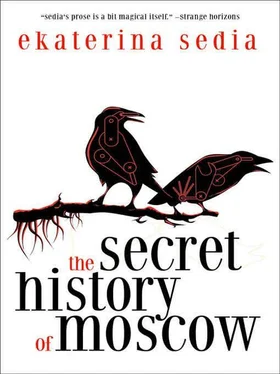"If we only knew where ‘here’ was,” Yakov said.
"Underground,” Fyodor said. “Isn't that obvious?"
The road they stood on stretched before them, a single dirt lane worn deep in twin ruts. Tents, wooden shacks, abandoned haylofts lined the road non-committally, sometimes tucked back under the clumps of gangly black bushes with twisting long branches, sometimes crowding it.
"It looks like my home village,” Fyodor said.
Yakov laughed. “No offense, but congrats on getting out."
Fyodor's gaze lingered over the road, and a slow smile stretched his lips, black in dim underground. “Thanks. Same to you, limitchik. What, you thought no one noticed?"
Yakov's face darkened, and his fists grew large and heavy. “Don't you talk to me like that. I'll fucking arrest you."
"Oh, a cop.” Fyodor laughed. “What, you think if you bark louder than everyone else and protect their shit they'll treat you like a man and not a dog? Keep dreaming, mutt."
Galina frowned. “What are you talking about? Who are ‘they'?"
Both men whipped around. “You,” they said in unison.
"You have something against Muscovites?” she asked, surprised. And laughed before they could answer. “And why are you discussing it now?"
"As good a time as any,” Yakov said. “But this ain't Moscow, so we can leave it for now."
Fyodor shook his head. “You're sure we're not under some KGB dungeon? This road probably leads to the Lubyanka or a secret prison or something."
"I thought you blamed gypsies,” Galina said.
Fyodor lit another cigarette. “I blame everyone."
Galina quelled another argument before it broke out by starting down the road. “I wonder if it leads to a river,” she said. “Like the Styx."
Yakov walked next to her, pointedly leaving Fyodor to bring up the rear. “I'm expecting more of a hovel on chicken shanks situation,” he said. “You know, like in the children's tales."
"I don't,” Galina said. “All my childhood books were translated-English stories. Jack the Giant Slayer, and others I can't remember."
"Huh,” Yakov said. “That's weird. I also had a bunch of English books when I was little, from my grandfather. When we left Serpuhov, my mom threw them out."
The shacks and tents gave way to trees, a park of sorts. The trees stood tall and bare, their skeletal branches phosphorescing with a weak light. They crowded the road and the branches touched above their heads, forming a lacy canopy against the black backdrop of non-existent sky.
"Definitely Baba Yaga territory,” Fyodor said. “I'd like to see you try to apprehend her."
"Simple. Citizen Yaga, you're under arrest,” Yakov responded, and all three snickered uneasily.
The road meandered and almost disappeared, thinning to barely visible tracks in the fat white grass the sight of which filled Galina with irrational disgust. White birds-starlings and rooks-studded the trees like pimples. Galina wondered if they were different from the birds outside, or if the regular birds gradually changed color underground, shedding their dark feathers and growing new ones, white like shrouds.
A faint noise that grew for some time finally crossed into her awareness, and she listened to the quiet but powerful throb. It sounded as if it came from a great distance, and she guessed that close by it would roar, deafening. Like a waterfall, she thought, the waterfall of the escalator that brought her down to the overturned skeleton of the funeral barge-the subway station had foreshadowed what was concealed below, and she had to wonder if it were intentional.
People outside, the people that used to run things back in her remote pioneer childhood and who still seemed to be running them now, must have had a hand in the identical design of the above and below ground; suddenly, Fyodor's words about the secret KGB dungeons did not sound as ridiculous. It made sense that the communists would find and harness the river Styx, perhaps turn it around and plop a hydroelectric station on it, squatting like an ugly cement toad and polluting cold black waters. Charon was dead, rotted to nothing in a labor camp some years ago, and his barge, raised to the surface, was cynically used as the skeleton of the train station below, and nobody ever knew. They probably still charged for the crossing though, and she dug through her pockets.
"What are you looking for?” Yakov said.
"Coins,” she answered. “In case we need to pay to cross Styx."
"I have it covered,” Fyodor said from behind. “Don't worry about coins. But why are you so hung up on Styx?"
"Listen,” Galina said. “Doesn't it sound like a waterfall?"
They listened. The thrumming and the distant roar were growing louder.
"That doesn't sound like a river,” Yakov said. “It's-mechanical."
"Hydroelectric station,” Galina said.
"That's a station all right,” Fyodor said, and pointed at the clearing before them. The trees stepped away from the path, clearing the view of something huge and undoubtedly manmade, gray and low to the ground. It looked like an abandoned construction site, with irregular planes and smokestacks jutting upwards and covered with sailcloth in places, as if to protect the impossibly large thing from rain.
They approached the construction cautiously; in the gray underground light, it seemed especially dead. They circled around the base, all the while looking for people. The thing shuddered with some internal torment, producing a hum so loud they had to yell to hear each other; fortunately, there wasn't much to say except an occasional exclamation of surprise.
The walls of the contraption were cracked with age, and thick white grass stems had invaded the fissures; a black shrub hung out of an especially large crack, and its roots, thick as ropes, crumbled the cement around it trying to reach the ground.
Galina circled the foundation as the sailcloth flapped over her head like a pair of sluggish wings. She looked away from the construction, and called to Yakov and Fyodor to come and see. Previously concealed from their view, a town hid in the shadow of the humming monstrosity-the first wooden buildings and pavements started just a hundred meters away or so. More importantly, there were people in the streets.
They entered the town; at first Galina thought that they had stumbled upon a secret underground prison, but the people seemed too well fed and lacked that haunted spiritual look she usually associated with political prisoners.
Except one man. Dressed in a thick sailcloth jacket, hol-low-cheeked and old, he stopped in the middle of the narrow street, his deeply-set eyes catching Galina's. “New here?” he asked in a low rumbly voice.
Galina was about to answer, but Yakov interrupted her. “Yes,” he said. “We are searching for missing people…"
"My sister,” Galina interjected quickly.
"Yes. People turning into birds-do you know anything about it?"
The old man chewed the air with his empty mouth. “Birds,” he said. “Don't know about them. Sovin's my name. I can show you around.” He looked over Galina and the rest, as if appraising them. “Funny we don't see more young people around here these days."
"Here?” Yakov said.
He motioned around him, vaguely. “Yeah, here. Where the fuck else? You're underground, and that's all anyone ever needs to know. As I was saying, not many young people come here these days; I'm really surprised."
"Why?” Galina asked.
"It's always more when things turn shifty on the surface,” Sovin said. “I hear in the thirties and forties we were getting refugees in droves. In the sixties it was better for a bit, but then in the seventies and eighties, there's always been a steady trickle. We were taking bets on how much the traffic will increase in the nineties, what with all the fucking insanity that's going on. But nothing, imagine that."
Читать дальше












